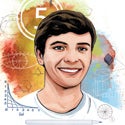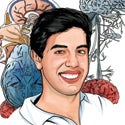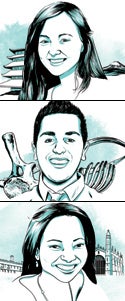Follow Your Inspiration
Introduction by Pamela J. Johnson
Profiles by Ambrosia Viramontes-Brody
So you’re undecided. That’s OK!
Finding your place in the world has just become easier. Launched officially this Fall, First-Year Investigations (FYI) gives incoming freshmen and transfer students the tools and empowerment they need to discover all that USC Dornsife has to offer.
“Why not explore as many of your interests as you can?” said George Sanchez, professor of American studies and ethnicity, and history, and vice dean for diversity and strategic initiatives in USC Dornsife. Sanchez co-created the program with Donal Manahan, professor of biological sciences and vice dean for students, and Steven Lamy, professor of international relations and vice dean for academic programs.
“Take some time to figure out your major,” Sanchez said. “Take a little bit of this and a little bit of that. It’s what general education is all about.”
The 30 two-unit, credit-no credit FYI courses are taught by eminent faculty in small classroom settings on subjects from how to look at artwork to why people believe weird things. Humanities, social sciences and sciences are offered, but moreover, the professors — or Dornsife Faculty Fellows — point students toward research, overseas and internship opportunities. Then they lead them to the resources and programs — Student Opportunities for Academic Research (SOAR), Summer Undergraduate Research Fund (SURF) and Problems Without Passports (PWP) to name a few — to make it happen.
The professor-mentors help students with any obstacles they may face.
For example, Frank Manis, professor of psychology, who is teaching FYI course “The Origin of a 20-Something,” shows students how to start ongoing conversations with their professors. In an exercise, Manis plays the professor and has his students approach him as if visiting during office hours.
For the final project, Manis’ students are developing research proposals to bring to a professor who may sponsor them through the SOAR, SURF, PWP or other programs.
“Coming up with and refining a research idea is sometimes the hardest part about getting started,” Manis said. “Then students have to identify which faculty and programs might help them. I’m trying to get them to think about a project that’s feasible and get them into the spirit of research.”
The guidance doesn’t stop after the semester ends. The program is meant to establish long-lasting intellectual relationships and guidance throughout students’ academic careers and beyond.
It begins with helping students, who are also paired with FYI peer mentors, to transition and acclimate during their often-overwhelming first year. Finding one’s place at a liberal arts college offering more than 60 majors and 80 minors within a major research institution can be daunting for transfer students and freshmen.
“I feel privileged to have the first impact on incoming students,” said Margaret Rosenthal, professor and interim chair of Italian, whose FYI course is “Renaissance Man/Renaissance Woman in American Culture.”
“I have a feeling they won’t ever forget this small class setting and their fellow students,” Rosenthal said.
For students in scientific fields, where freshmen classes may number 250, it can prove challenging to have direct contact with the professor teaching the course.
Stephen Bradforth, professor of chemistry, is teaching the FYI seminar “The Global Energy Crisis — How to Make Sense of It All.”
“Being a mentor should be a natural part of being a faculty member,” Bradforth said. “Rather than being ‘the sage on the stage,’ the expectation should be that students meet with faculty members at least once a week. There should be a conversation ongoing between the professor and student. FYI gives students the framework to do that.”
USC’s largest academic hub, USC Dornsife enrolled about 40 percent of the entire incoming class in 2011. The admission target was surpassed this Fall with more than 1,200 freshmen and 625 transfer students — and counting.
The greatest single gift in USC’s history — $200 million — was given by Dana and David Dornsife to USC’s liberal arts college. The Dornsifes believe that USC Dornsife has the power to effect change. When students ask, “How can my education change the world?” FYI shows them.
First-Year Investigations Students
 |
Brendan Dugan Hometown: Summit, New Jersey Major: Mathematics Class: How to Look at a Work of Art |
 |
Tienju Wang Hometown: Dallas, Texas Major: Biological Sciences Class: Why Do People Believe Weird Things…and How can Psychology Help Us Answer This Question? |
 |
Katherine Montgomery Hometown: Montclair, New Jersey Major: Creative Writing Class: To Be Real: Interrogating Authenticity Instructor: Lanita Jacobs, anthropology, and American studies and ethnicity |
 |
Justin Farshidi Hometown: San Marino, California Major: Undecided Class: Thinking About the Brain Instructor: Larry Swanson, biological sciences, neurology and psychology |
First-Year Investigations Peer Mentors
For more information about FYI, visit dornsife.usc.edu/fyi
Read more about the Dornsife Faculty Fellows
Read more articles from Dornsife Life magazine’s Fall 2011/Winter 2012 issue
